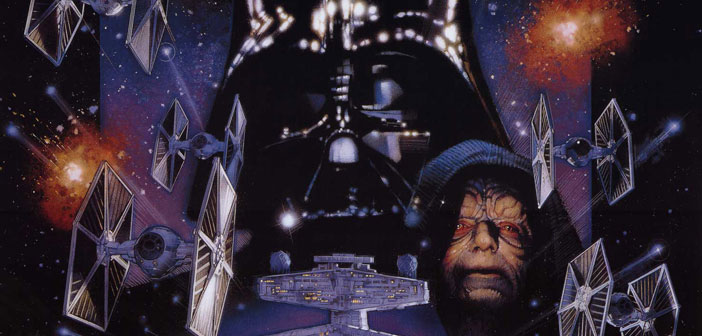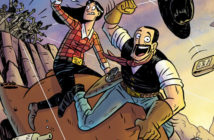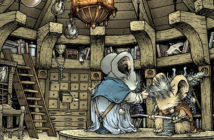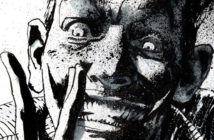All fans of the Star Wars trilogy have a clear memory of where they were when they saw their first installment. Tony Pacitti certainly does, and it’s an event that he poignantly documents in his book, My Best Friend is a Wookiee: One Boy’s Journey to Find His Place in the Galaxy.
I recently had the opportunity to talk with Tony about his book, his love of the Star Wars films, and some other serious and not-so-serious topics.
BROKEN FRONTIER: Throughout My Best Friend is a Wookiee, you said that you knew you wanted to be a professional writer. With that in mind, how did it feel when you learned that your memoir was going to be published?
TONY PACITTI: Getting the phone call that my publisher wanted to buy my book was surreal. I was expecting a phone call—the guy who ended up being my editor had given me a heads up that he was pitching the idea that week—but I honestly didn’t expect the call that I got. I had sent out a lot of query letters and proposals but hadn’t heard anything in a while. Needless to say, it was a most pleasant surprise.
SURMAN: Talk a little bit about the process you went through in writing My Best Friend is a Wookiee, from its conception to finding a publisher.
PACITTI: The initial idea was to look critically at the release of the prequel trilogy along side other big trilogy/film series released in the last decade and see how/if they impacted pop culture the same way the originals had. The gimmick would be to sort of introduce each film with a personal anecdote about where I was when I saw it.
But I pretty quickly found that not only did I have a lot to say about Star Wars, but that the theatrical releases of the prequels and the re-releases of the originals all lined up perfectly with these universal, adolescent milestones. It was honestly a bit frightening how well it all fit together. After realizing that, I made a list of when I saw each film for the first time and what was happening in my life at the time. My initial outline is pretty close to the timeline the book follows.
After about 10 months of writing and a bit of revising, I started sending letters to agents to get an idea of any interest. I did that for a few months, constantly revising the manuscript I had while I was waiting for answers. Eventually one of my college roommates had mentioned what I was working on to his brother, who was interested and asked for a proposal. This brother ended up being my editor at Adams Media, but even that lucky break took months to pan out. All in all I spent two years working on the manuscript—save for a few discouraged, writing-less months in there—before it was out of my hands.
SURMAN: For someone that loves genre, it’s interesting that your first major work is nonfiction. What made you settle on writing a memoir instead of pursuing the more typical sci-fi or fantasy novel associated with you interests?
PACITTI: Well, I had spent a couple of years during college and maybe the first year afterwards trying to write comics and a lot of it was sci-fi/fantasy material. For one reason or another, almost all of these projects fell apart. I did get a couple of comics finished for a website called Pandemonium Comics, which is actually listed on the dust jacket of my book, but that all sort of fizzled out.
As it was becoming more obvious that any comic book irons I had in the fire were cooling, I started focusing more on short stories, but I was finding that I was borrowing from my own life experience to the point where it was just barely fiction. Combine that with what I said earlier about the weird, symbiotic life I’ve had with Star Wars—and it all just sort of came together.
SURMAN: You briefly reflected on the Columbine shootings in your book. There was and is a lot of misinformation that surrounds the tragedy. One such fallacy is that the killers were bullied outsiders who were rejected by their peers. Considering the fact that you were an outsider in school, how did the events of Columbine affect you personally?
PACITTI: The fact that they were portrayed as outsiders certainly hit a chord with me. Mostly it was just an across-the-board feeling that school wasn’t necessarily safe. Ours was a suburban Massachusetts high school, so we had no frame of reference for school not being safe. Crappy, maybe, but never unsafe.
But the shooters were also portrayed as sort of the Goth kinds of kids. This was before I was hanging out with my school’s Goths, so that I didn’t connect with. I do remember that it shook some of those kids up. One kid in particular wore a black trench coat to school all the time because he was a big fan of The Crow. He didn’t wear it for a while after the shootings happened.
SURMAN: You mentioned in your book a Star Wars card tournament that turned out to be a true haven for society’s nerdy dregs. With a scene like this in mind, do you at all think the socially awkward and inept invite the ridicule they receive because of behavior? I don’t mean their interests, like Star Wars or comic books, but is there some kind of attitude that goes along with rejection that calls for trouble to begin with?
PACITTI: It’s tough because some people are just so extremely and naturally introverted that they can’t help but come off as a bit odd and with that comes a degree of stand-off-ishness. But a lot of times you find that people are just dicks. The Simpsons’ Comic Book Guy comes to mind. It’s an extreme and by no means am I accusing all of fandom of being sarcastic, know-it-all jerks who can’t be bothered with someone who doesn’t know what planet Kilowog comes from.
But you get that type of person in all walks of life. The person who rolls his eyes when you can’t name everyone on the Cowboys’ starting defensive line. The cinephile who can’t believe you’ve never seen Kurosawa’s entire catalogue. I’m sure I have been guilty of it in the past, becoming so rejected that at least I’m the master of something, but it’s something I actively try to avoid. There’s nothing to gain from being a douchey nerd. But being awkward and sort of odd in social situations, that can’t always be helped.
SURMAN: You wrote that The Empire Strikes Back was originally your favorite Star Wars film, but later in the story is fluctuates between A New Hope and Return of the Jedi. You’ve recently told me that it’s returned to being Empire—what brought you back full circle?
PACITTI: Once I was old enough to not think that the romance between Han and Leia was boring, it pretty much became my favorite. And honestly, the way it was updated for the special edition plays into it as well. Empire got off relatively easy if you ask me. It didn’t have any Greedo shooting first or embarrassing musical numbers to really get fans riled up.
But really, it’s the characters that make it my favorite. They just all come to life in ways that they didn’t in A New Hope and Return of the Jedi. It’s the one film of the entire series where everyone feels like a real human being—wookiees, droids, and Yoda included—and the only one where their futures aren’t necessarily written in stone. Everything was real in Empire.
SURMAN: You have a passionate dislike for the new trilogy of Star Wars prequels. You mentioned in your prose that Revenge of the Sith turned out to be your greatest disappointment, and yet you recently told me that it’s now the most liked of the new movies. Why is that?
PACITTI: Well, within the context of the book, there’s a lot of personal baggage I took into the theater with me. On top of that, I had refused to lower my expectations, despite not loving, or even really liking, the previous two. I was telling myself otherwise, but I was pretty much walking in to the movie knowing deep down that I was going to hate it. I talk about seeing the movie twice in the book and until two months ago those were the only times I had watched it start to finish.
After seeing it again recently, without all the hype and without all the personal baggage and with a renewed interest in the universe, I was able to enjoy it. The relationship between Anakin and Padme still comes off as weak as ever, but the rest of it works, mostly because there’s a clear-cut conflict at hand. Episodes I and II are bogged down by a lot of politics and unexplained motives.
At the end of the day, we still don’t get a good idea from the movies who the Separatists are, but by Revenge of the Sith, it doesn’t matter. They’re there, there’s a war on, and our hero is walking a thin line between good and evil. If they all had been on par with Revenge of the Sith, I think we’d be looking at a very different post-prequel world. Having said all that though, it still doesn’t hold a candle to the originals, but by now that’s quite the dead horse.
SURMAN: In respect to that, what are your feelings on The Phantom Menace and Attack of the Clones today? Have they changed since you committed your initial opinions in print?
PACITTI: I stand by my feelings on The Phantom Menace. There’s some cool spectacle in it, but at the end of the day it’s boring and Jar Jar was way too much. The only way my opinion has changed towards Attack of the Clones is that it’s now, and always will be, my least favorite. I feel like it could have been the text crawl to any number of more interesting movies. Plus, the whole clone army secretly being built under a Jedi’s orders could have made for a really cool mystery, but instead, they just drop it. I think they explain it in a tie-in novel, but odds are John Q. Movie-goer isn’t going to be reading up on the expanded universe. Why not include it in the movie?
SURMAN: You read many of the Star Wars novels when you were young; you played the card game; you had an all-around ravenous appetite for the franchise. What is your opinion now of all of the supplementary Star Wars materials out there? Is it still fun or have you had your stomach full?
PACITTI: Honestly, I’ve been very out of touch with the expanded universe. Around the time Episode I came out, I sort of walked away from all of the supplementary material, but I’ve always sort of kept an ear to the ground. I have a very loose understanding of the galaxy’s current events. Recently I started up on Star Wars: Legacy, which is fun. It’s good to see a Skywalker who wants nothing to do with the family name—it keeps it interesting. Dark Horse also has a bunch of Star Wars Omnibus collections, which I’ve been enjoying. I also read Death Troopers, which was certainly different. I enjoyed it.
SURMAN: Specifically, what about the Genndy Tartakovsky Clone Wars cartoon for Cartoon Network and the subsequent CGI series?
PACITTI: I loved Tartakovsky’s Clone Wars, but I love everything he does. I’m curious as to how or if his series fits in with the events of the current Clone Wars show, which I also like. I wasn’t a big fan of the Clone Wars movie, and in hindsight I feel like it was just a weak introduction to the new characters, but since then I’ve really come around. This season’s been a little slow, but it looks like they have some really interesting things lined up for the next few months. You can tell that it’s made by people who genuinely love this world; it comes across in the details.
SURMAN: During the years of the new trilogy, the Lord of the Rings films were released. How did you fanboy heart react to them?
PACITTI: I really liked the films. I’m sure purists have their issues with them, but I was only ever a casual Tolkien fan. I also think that they played a big part in making geeky mainstream, for better or worse. I for one don’t see a problem with that.
SURMAN: Like you, I’m also greatly disappointed and saddened by the new trilogy—I never felt that same glee like when I saw The Empire Strikes Back and Return of the Jedi for the first time. But a year ago, I reluctantly saw a movie I assumed to be overrated called Avatar. However, I was instantly spellbound when the film began. I can honestly say I was touched with the same love when I saw the original Star Wars films so many years ago. Has anything else sci-fi or fantasy riveted you the way the original Star Wars trilogy did?
PACITTI: First off, I was in the same boat with Avatar. I love James Cameron. But I really didn’t think Avatar would live up. He was talking a big game for so long, but man, that movie was a hell of a lot of fun. People complain that the story was old, but that wasn’t the wheel Cameron was trying to reinvent. That movie was a game changer like the first Toy Story and Jurassic Park were game changers in the 90s. Avatar did change the way we watch and make movies.
But, for me personally, I don’t think I’ve had a reaction to a movie quite like I did with Star Wars. I feel like Pixar really does movie magic like no one else, and I have certain filmmakers whose movies I will always be ready to see on opening day, but I don’t look for that lightning to strike again. If I learned anything from the prequels and then from writing this book, it’s that you have to need that moment, not want it.
SURMAN: Do you regret your Rebel tattoo?
PACITTI: I regret not getting it in red, but otherwise no, never.
SURMAN: Do you have any projects planned for the future?
PACITTI: I know that I would like to have a project planned. But for now, I’m just regrouping after one hell of a good year. We’ll see what happens.
This interview originally appeared on Broken Frontier.




